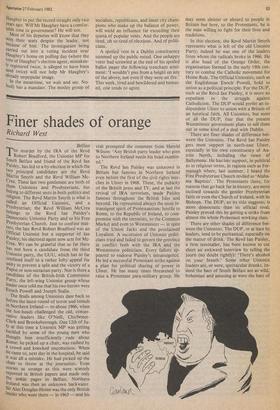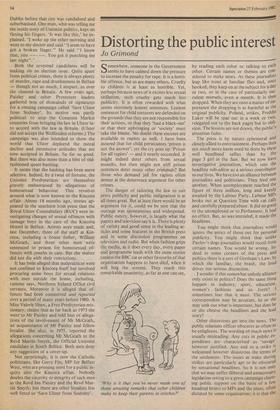Finer shades of orange
Richard West The murder by the IRA of the Revd Robert Bradford, the Unionist MP for South Belfast and friend of the Revd Ian Paisley, has led to a by-election in which the two principal candidates are the Revd Martin Smyth and the Revd William Mc- Crea. These last two gentlemen are both of them Unionists and Presbyterians, but belong to different sects in both politics and religion. The Revd Martin Smyth is what is called an Official Unionist, and a Presbyterian; the Revd William McCrea belongs to the Revd Ian Paisley's Democratic Unionist Party and to his Free Presbyterian Church. Just to confuse mat- ters, the late Revd Robert Bradford was an Official Unionist but a supporter of Ian Paisley; his electoral agent now acts for Mc- Crea. We can be grateful that so far there has not been a candidate from the third Unionist party, the UUU, which has so far confined itself to a rather lofty appeal for unity to prevent a split and the victory of a Papist or non-sectarian party. Nor is there a candidate of the British-Irish Communist Party, the left-wing Unionist group whose leader once told me that his two heroes were Enoch Powell and Joseph Stalin.
The feuds among Unionists date back to before the latest round of terror and tumult in Northern Ireland — to about 1966, when the hot-heads challenged the old, conser- vative leaders like O'Neill, Chichester- Clark and Brookeborough. One 12th of Ju- ly at this time a Unionist MP was getting heckled by some of the young men who thought him insufficiently rude about Rome; he picked up a chair, was rushed by a crowd and knocked unconscious. When he came to, next day in the hospital, he said it was all a mistake. He had picked up the chair to throw at the journalists. Even stories as strange as this were scarcely reported in British papers and made only the inside pages in Belfast. Northern Ireland was then an unknown backwater. Sir Alec Douglas-Home was the only British leader who went there — in 1963 — and his visit prompted the comment from Harold Wilson: 'Any British party leader who goes to Northern Ireland needs his head examin- ed.'
The Revd Ian Paisley was unknown in Britain but famous in Northern Ireland even before the first of the civil rights mar- ches in Ulster in 1968. These, the pubicity of the British press and TV, and at last the revival of IRA terrorism, made Paisley famous throughout the British Isles and beyond. He represented always the most in- transigent spirit of Protestantism: hostile to Rome, to the Republic of Ireland, to com- promise with the terrorists, to the Common Market and even to Westminster — in spite of the Union Jacks and the proclaimed Loyalism. A succession of Unionist politi- cians tried and failed to govern the province in conflict both with the IRA and the Westminster politicians. Every failure ap- peared to endorse Paisley's intransigence. He led a successful Protestant strike against a plan for political sharing of power in Ulster. He has many times threatened to raise a Protestant para-military group. He may seem sinister or absurd to people in Britain but here, to the Protestants, he is the man willing to fight for their lives and traditions.
In this election, the Revd Martin Smyth represents what is left of the old Unionist Party; indeed he was one of the leaders from whom the radicals broke in 1966. He is also head of the. Orange Order, the organisation formed in the early 19th cen- tury to combat the Catholic movement for Home Rule. The Official Unionists, such as the Englishman Enoch Powell, hold to union as a political principle. For the DUP, such as the Revd Ian Paisley, it is more an expedient in the struggle against Catholicism. The DUP would prefer an in- dependent Ulster to union with a Britain of an heretical faith. All Unionists, but most of all the DUP, fear that the present Westminster government plans to sell them out in some kind of a deal with Dublin.
There are finer shades of difference bet- ween the Unionists. The Revd Ian Paisley gets most support in north-east Ulster, especially in his own constituency of An- trim North, including the town of Ballymena. He has less support, in political as in religious terms, in regions such as Fer- managh where, last summer, I heard the Free Presbyterian Church reviled as 'Alaba- ma Baptists'. The Protestants there, for reasons that go back far in history, are more inclined towards the gentler Presbyterian faith or even the Church of Ireland, with its Bishops. The DUP, as its title suggests, is more democratic than its official rival; Paisley proved this by getting a strike from almost the whole Protestant working class.
There are other shades of difference bet- ween the Unionists. The DUP, or at least its leaders, tend to be puritanical, especially on the matter of drink. The Revd Ian Paisley, a firm teetotaller, has been known to cut short an awkward interview by telling the journ (no doubt rightly): 'There's alcohol on your breath.' Some other Unionist leaders are, or were, spectacular drunks. In- deed the bars of South Belfast are as wild, bohemian and amusing as were the bars of Dublin before that city was vandalised and suburbanised. One man, who was telling me the inside story of Unionist politics, kept on flexing his fingers. 'It was like this,' he ex- plained. 'I woke up the other morning and went to my doctor and said "I seem to have got a broken finger." He said "I know that, you --- --. You got it punching me last night" .'
Both the reverend candidates will be making sin an election issue. Quite apart from political crimes, there is always plenty of murder, rape and drunkenness in Belfast -- though not as much, I suspect, as over the channel in Britain. A few years ago, Paisley and other Protestant leaders gathered tens of thousands of signatures for a rousing campaign called 'Save Ulster from Sodomy'. Its motive was partly political: to stop the Common Market countries from bringing the law in Ulster in- to accord with the law in Britain. (Ulster did not accept the Wolfenden reforms.) The campaign was also intended to show the world that Ulster deplored the moral decline and permissive attitudes that are now accepted in Britain. So far so good. But there was also more than a hint of old- fashioned queer-bashing.
It seems that the bashing has been more selective. Indeed, by a twist of fortune, the Unionist Presbyterians are themselves gravely embarrassed by allegations of homosexual behaviour. This revolves around what is now known as the Kincora affair. About 18 months ago, stories ap- peared in the southern Irish press that the Royal Ulster Constabulary (RUC) were in- vestigating charges of sexual offences with teenage boys in the care of the Kincora Hostel in Belfast. Arrests were made and, last December, three of the staff at Kin- cora, including a house father, William McGrath, and three other men were sentenced to prison, for homosexual of- fences with youths in care. But the matter did not die with their convictions.
It has been alleged that malpractices were not confined to Kincora itself but involved procuring some boys for sexual relations with men outside the home, including, rumour says, Northern Ireland Office civil .servants. Moreover it is alleged that of- fences had been committed and reported over a period of many years before 1980. A Miss Valerie Shaw, a Free Presbyterian mis- sionary, claims that as far back as 1973 she went to Mr Paisley and told him of allega- tions of the involvement of Mr McGrath, an acquaintance of Mt Paisley and fellow loyalist. She also, in 1975, reported the allegations concerning Mr McGrath to the Revd Martin Smyth, the Official Unionist candidate in South Belfast. Both men deny any suggestion of a cover-up.
Not surprisingly, it is now the Catholic politicians, like Gerry Fitt, MP for Belfast West, who are pressing most for a public in- quiry into the Kincora affair. Nobody doubts the sincerity or integrity of such men as the Revd Ian Paisley and the Revd Mar- tin Smyth; but there are other loyalists less well fitted to 'Save Ulster from Sodomy'.





































 Previous page
Previous page